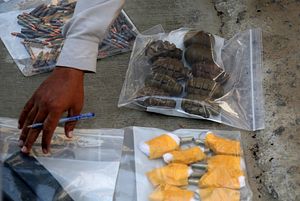On Friday, armed insurgents attacked the Chinese consulate in the southern Pakistani city of Karachi on the Arabian Sea coast. According to Pakistani authorities, at least four people—two civilians and two policeman—were killed by a group of three armed insurgents with suicide vests.
All three attackers were also killed after a gunfight. No Chinese nationals were killed or injured in the attack, the Chinese embassy in Islamabad confirmed. Authorities found that the attacks had additional explosives in a car nearby the scene.
The attack has been claimed by the Balochistan Liberation Army, but the Pakistani government has yet to definitively attribute the attack to any group. Speaking on Friday, Pakistani Foreign Minister Shah Mahmood Qureshi said that it was too soon to attribute the attack.
Pakistani Prime Minister Imran Khan condemned the Karachi attack as well as a separate attack the same day in the Orakzai region that killed some 30 people and wounded as many as 40.
The prime minister described the attacks as “part of [a] conspiracy” against Pakistan’s “economic and strategic cooperation” with China.
“We appreciate the Pakistani army and police for their timely and proper action against the attack. We extend our deep condolences to the two Pakistani policemen martyred in the attack. Any attempt to undermine China-Pakistan relationship is doomed to fail,” the Chinese embassy in Islamabad noted in a statement.
The China-Pakistan Economic Corridor (CPEC), announced in April 2014 by Chinese President Xi Jinping and former Pakistani Prime Minister Nawaz Sharif, is a collection of a variety of projects in transportation, infrastructure, telecommunications, and other areas, all backed by billions in Chinese financing.
The southern terminus of the corridor lies in the restive Pakistani province of Balochistan, which is the largest Pakistani province by area and has long struggled with separatist insurgent groups. Pakistani workers involved in CPEC projects have come under attack by insurgents in recent years.
To ensure the security of both Chinese officials and engineers involved in CPEC projects, the Pakistani military stood up a Special Security Division in 2016 comprising 15,000 troops.
According to reports earlier this year, the Chinese government had secretly held direct talks with Baloch militants in an effort to protect CPEC projects. The Financial Times reported that “Beijing had been in direct contact with militants in the south-western state of Baluchistan.”
In Pakistan, domestic scrutiny of CPEC projects has grown in recent years and was a major issue in the lead-up to the July general elections. Prime Minister Imran Khan recently completed his first visit to Pakistan earlier this month where he reaffirmed the longstanding close partnership between the two countries with Xi.
During Khan’s visit, Xi said that China was “willing to work with the prime minister to strengthen the China-Pakistan all-weather strategic partnership and build a new era.”
“Even though situations in international and domestic politics change, the bilateral relations will continue to improve,” he added.

































